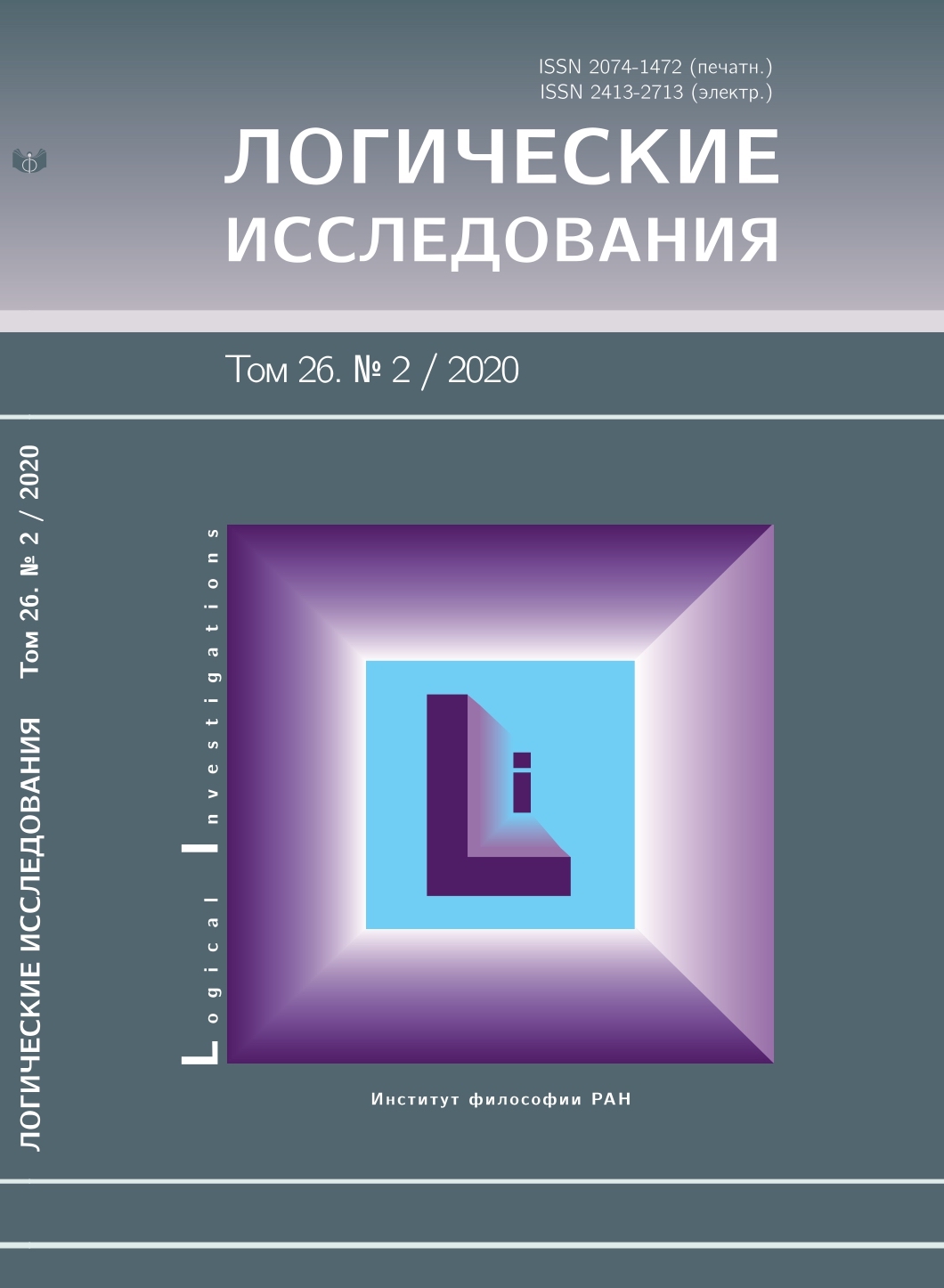Formal modeling of human reasoning: errors, limitations and Baconian bees
##plugins.themes.bootstrap3.article.main##
Abstract
Since the end of the XX century we are witnessing a practical, or cognitive, turn in logic. Drawing on enormous achievements brought about by the mathematical turn that started more than a hundred years ago, logic now has came back to its Artistotelian roots as an instrument by which we come to know anything. The re-forged alliance between logic – now well equipped with sophisticated formal tools – and psychology results in more and more substantial developments in studies on human reasoning and problem solving. To reap the fruits of this alliance we need to be aware that it leads to a shift in focal points of interest of such studies as well as to expansion of their methodological repertoire. In this paper I argue that the practical turn in logic results in: (1) the concept of error becoming crucial for formal modeling of human reasoning processes, (2) prescriptive perspective, which takes into account human limitations in information processing, becoming the most interesting vantage point for such research and (3) triangulation of formal methods, quantitative approach and qualitative analyses becoming most effective methodology in formal modeling studies.
##plugins.generic.usageStats.downloads##
##plugins.themes.bootstrap3.article.details##
Copyright (c) 2020 Mariusz Urba'nski

This work is licensed under a Creative Commons Attribution-NonCommercial 4.0 International License.
References
Beneke, 1832 – Beneke, F.E. Lehrbuch der Logik als Kunstlehre des Denkens. Berlin: Ernst Siegfrieg Mittler, Posen und Bromberg, 1832. 196 pp.
Boole, 1854 – Boole, G. An Investigation of the Laws of Thought. London: Walton and Maberly, 1854. 424 pp.
de Morgan, 1847 – de Morgan, A. Formal Logic, or The Calculus of Inference, Necessary and Probable. London: Taylor and Walton, 1847. 336 pp.
Evans, 2012 – Evans, J.S.B.T. “Questions and challenges for the new psychology of reasoning”, Thinking & Reasoning, 2012, Vol. 18, No. 1, pp. 5–31.
Frege, 1884 – Frege, G. Die Grundlagen der Arithmetik: Eine logisch mathematische Untersuchung ¨uber den Begriff der Zahl. Breslau: W.Koebner, 1884.
Gabbay and Woods, 2005 – Gabbay, D.M. and Woods, J. The Reach of Abduction. Insight and Trial. Elsevier, 2005. 476 pp.
Haack, 1993 – Haack, S. Evidence and Inquiry: Towards Reconstruction in Epistemology. Oxford: Blackwell, 1993. 272 pp.
Hintikka, 2007 – Hintikka, J. “Abduction – Inference, Conjecture, or an Answer to a Question?”, in: Socratic Epistemology. Explorations of Knowledge-Seeking by Questioning. Cambridge: Cambridge University Press, 2007, pp. 38–60.
Husserl, 1901 – Husserl, E. Logische Untersuchungen. Halle: Max Niemeyer Verlag, 1900/1901.
Kisielewska et al., 2016 – Kisielewska, M., Urba´nski, M., and Paluszkiewicz, K. “Abduction in One Intelligence Test. Types of Reasoning Involved in Solving Raven’s Advanced Progressive Matrices”, in: Model-Based Reasoning in Science and Technology, Magnani, L. and Casadio, C. (eds.). Springer, 2016, pp. 419–435.
Kurtz et al., 1999 – Kurtz, K.J., Gentner, D. and Gunn, V. “Reasoning”, in: Cognitive Science, Handbook of Perception and Cognition, B. M. Bly (ed.), 2d ed. Elsevier, 1999, pp. 145–200.
Levy, 1997 – Levy, S.H. “Peirce’s theoremic/corollarial distinction and the interconnections between mathematic and logic”, in: Studies in the Logic of Charles Sanders Peirce, Houser, N., Roberts, D.D., and Evra, J.V. (eds.). Bloomington, IN: Indiana University Press, 1997, pp. 85–110.
Macnamara, 1986 – Macnamara, J. A Border Dispute. The Place of Logic in Psychology. Cambridge, MA: MIT Press, 1986.
Peirce, 1958 – Peirce, C.S. Collected Works. C. Hartshorne, P. Weiss and A.W. Burks (eds.) Cambridge, MA: Harvard University Press, 1958.
Stanovich, 1999 – Stanovich, K.E. Who Is Rational? Studies of Individual Differences in Reasoning. Mahwah, NJ: Lawrence Erlbaum, 1999. 296 pp.
Stenning and van Lambalgen, 2008 – Stenning, K. and van Lambalgen, M. Human Reasoning and Cognitive Science. Cambridge, MA: MIT Press, 2008. 424 pp.
Urbański, 2011 – Urbański , M. “Logic and cognition: the faces of psychologism”, Log. Log. Philos., 2011, Vol. (20), pp. 175–185.
Urbański and Grzelak, 2019 – Urbański, M. and Grzelak, J. “On two simple models for one simple game: ‘guess who?’, Inferential Erotetic Logic, and situational semantics”, in: Reasoning: Logic, Cognition, Games, Urba´nski, M., Skura, T. and Lupkowski, P. (eds.). London: College Publications, 2019, pp. 1–18.
Urbański and Klawiter, 2018 – Urbański, M. and Klawiter, A. “Abduction: some conceptual issues”, Log. Log. Philos., 2018, Vol. (27), pp. 583–597.
Urbański et al., 2016 – Urbański, M., Zyluk, N., Paluszkiewicz, K., and Urba´nska, J. “A Formal Model of Erotetic Reasoning in Solving Some what Ill-Defined Problems”, in: Argumentation and Reasoned Action Proceedings of the 1st European Conference on Argumentation, Lisbon 2015, Mohammed, D. and Lewi´nski, M. (eds.). London: College Publications, 2016, pp. 973–983.
van Benthem, 2008 – van Benthem, J. “Logic and Reasoning: do the facts matter?”, Studia Logica, 2008, Vol. 88, No. 1, pp. 67–84.
Zajenkowski et al., 2014 – Zajenkowski, M., Garraffa, M., and Szymanik, J. “Working memory mechanism in proportional quantifier verification”, Journal of Psycholinguistic Research, 2014, Vol. 43, Is. 6, pp. 839–853.
Zelechowska et al., 2020 – Zelechowska, D., Zyluk, N., and Urba´nski, M. “Find Out: a new method to study abductive reasoning in empirical research”, Int. J. of Qualitative Methods, 2020, Vol. 19, pp. 1–11.
